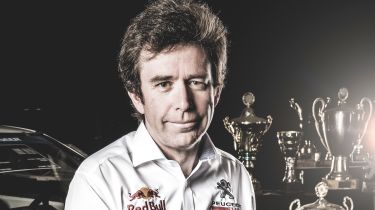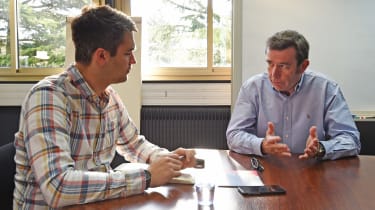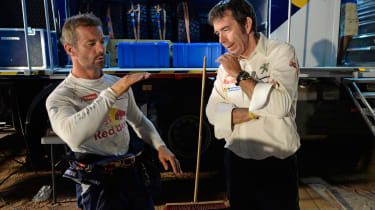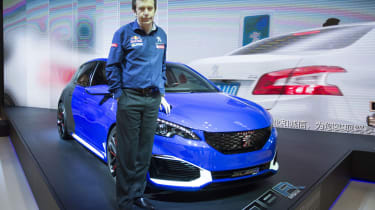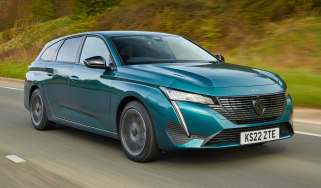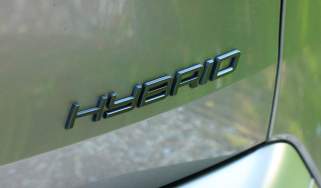The future of Peugeot Sport with boss Bruno Famin
In a revealing interview, Peugeot Sport boss Bruno Famin reflects on how far it has come, and what the future holds
Peugeot Sport’s headquarters in the Parisian suburb of Vélizy are unremarkable to behold. Only if you know what goes on behind its gates, as Bruno Famin does, would you be quite so happy to sit in a stuffy office, to be quizzed on the brand’s future.
As director of Peugeot Sport, Famin is intimately familiar with cars such as the 208 and 308 GTi, as well as more extreme projects like the 500bhp 308 R HYbrid concept and the Dakar-winning 2008 DKR. It’s these cars, as well as the ethos behind Peugeot Sport, that we’re here to discuss.
• Top 10 greatest Peugeot Sport road cars
Bruno Famin, Peugeot Sport director: Q and A
Q: What is the philosophy of Peugeot Sport? What are your priorities?
A: “The priority for us is to add value to the brand. Since 1981, Peugeot Sport has been at the heart of the brand’s strategy. We are back now at the origin of what was supposed to be Peugeot Sport. We are here to help improve the image of the Peugeot brand.”
Q: What are the key drivers for Peugeot Sport?
A: “All our cars are built with the know-how from Peugeot Sport. They undergo the same testing as the standard cars, and there is no waiver in quality. The tests on the engines are exactly the same. There is no deviation.”
Q: What’s the process behind the development of a race car, and more recently a road car?
A: “First you have to check the regulations, the feasibility, the competitors – to see how you could do before being given the green light. Then you start the pure design phase. We have no facilities here to make parts. When the design is done, we check it, we test it, we put it on the dyno.”
• Peugeot's greatest ever motorsport cars and drivers
Q: What proportion of parts from, say, the 208 GTi by Peugeot Sport make it into the 208 rally car?
A: “A tiny proportion. We start with the same basic shell; that’s the rules. We start with the standard engine – but with quite a lot of progression, of course. All the pistons, connecting rods, camshafts and inlets are modified, there’s a new turbo. The exhaust is specific.
“Then we modify the bodyshell to include the roll cage and make it stiffer. After that, the transmission is specific, the suspension is specific, the electronics are specific.”
Q: So Peugeot Sport is more than brand-building?
A: “All our customer activities are financially balanced. We spend money developing new products, in promoting our races, as well as on subsidiaries around the world to develop their own motorsport programme. We are doing this in many countries. We need to promote the products, to promote the image of our brand. We are also generating added value for the brand. In the middle of the pure competition cars, we have this new range of products ‘by Peugeot Sport’. These are standard cars sold through our dealers, but developed and produced by Peugeot Sport.”
Q: How far do you think the Peugeot Sport brand can go?
A: “For the time being, there is no limit. For now it is quite new. We have to develop ‘by Peugeot Sport’ versions systematically and economically. We have to make sure we have a good figure, to justify the cars.”
Q: Was the success of the 205 GTi ever a frustration? Do you feel as if you’re chasing the success of the 205?
A: “What is sure is that the context is totally different. At the time of the 205, you had three cars in that sector. The volumes were very different and the competition was very different. Now there are 45 or 50 competitors in the European market. It is much more difficult. But for sure, the 208 adds something from the 205. It’s a modern version.”
• Sebastian Loeb talks Peugeot, Rallycross and Dakar
Q: What do the next five years hold for Peugeot Sport?
A: “We shall still proceed along the same lines. We’ll still be adding sportiness, especially in the cars’ handling. We will be developing that. We will not follow the standard models, we’ll be ahead of the standard cars.
“With the 208 FE in 2013, we wanted to show that we’re able to develop a very low-emission car. Using Le Mans technology, we brought all our know-how in hybrid and combustion-engine technology, as well as aerodynamics and lightweight technologies, to bring everything together to make a 208 with very low emissions but with the performance of a GTi. We can be very responsible, and very sustainable, but always have the fun that’s associated with Peugeot cars.
“We are thinking about what we’ll do over the next five or six years. The new 208 or 308? We already know what we’ll do with these cars. We have a plan and we know where we are going. The RCZ R was not planned at all. We made that with all the people available. Now, in three or four years, things have changed completely. We are fully integrated into the plan and strategy of PSA.”
Q: Is electrification the perfect solution for future drivetrains?
A: “We made a very big demonstration of that with the 308 R HYbrid. Electrification is a very good way of adding significant power while also making the most of recovered energy. Systems such as that allow for four-wheel drive, too.”
Q: What about a performance diesel?
A: “We have no plan to do that for the time being. I think electrification is much more suited to Peugeot Sport than diesel power. We are much more on the electrification strategy than diesel.”
Peugeot Sport: from race to road
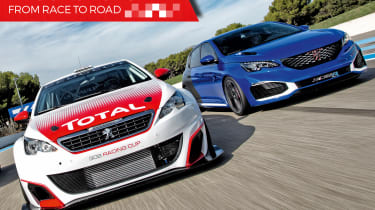
Our special guide to the past, present and future of Peugeot Sport...
- • Top 10 greatest Peugeot Sport road cars
- • Peugeot's greatest ever motorsport cars and drivers
- • Ari Vatanen: interview with the motorsport legend
- • Sebastian Loeb talks Peugeot, Rallycross and Dakar
- • The future of Peugeot Sport with boss Bruno Famin
- • WIN a VIP Weekend at the World RX Championship
Find a car with the experts

